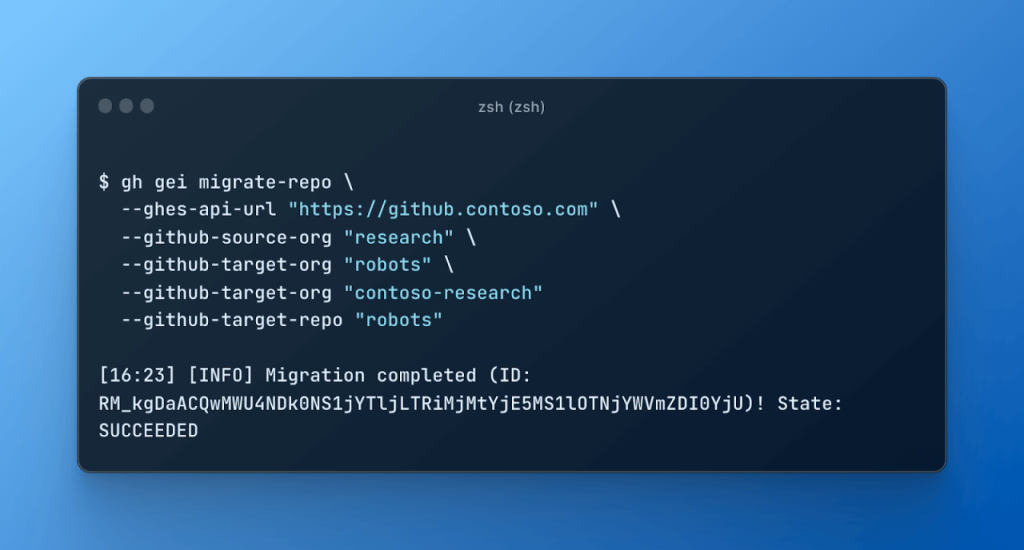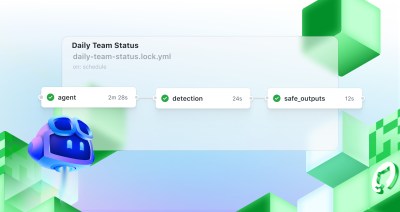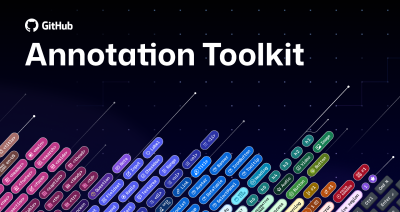Cloud migration made easy: introducing GitHub Enterprise Importer
With GitHub Enterprise Importer, you can seamlessly move to GitHub Enterprise Cloud, bringing your code and collaboration history with you so your team doesn’t miss a beat.

If you want to move to GitHub.com and benefit from all of the great features developers love—from GitHub Actions to GitHub Codespaces—you’ll have existing data that you want to bring with you.
GitHub already offers a range of tools and services—from GitHub Actions Importer to Expert Services for companies planning complex migrations—to help teams to migrate from other platforms to GitHub so that they can hit the ground running quickly.
Today, we’re launching GitHub Enterprise Importer, a self-serve tool which empowers teams to migrate their code, history, and collaboration context to GitHub Enterprise Cloud.

Introducing GitHub Enterprise Importer
GitHub Enterprise Importer (GEI) enables high-fidelity, self-serve migrations to GitHub Enterprise Cloud and GitHub.com.
GitHub Enterprise Importer migrates your code, but the code is the easy bit—it also brings all your conversations and collaboration history with you. That means things like pull requests, reviews and comments. This is a game changer when you need to understand not just the history of your code, but the “why” behind that history.
We’re publicly launching GitHub Enterprise Importer today—but already, it has been used by over 2,000 customers to migrate more than 400,000 repositories to GitHub Enterprise Cloud.
Migrating our code with GitHub Enterprise Importer was frictionless. We quickly moved 5,300+ repos from GitHub Enterprise Server to GitHub Enterprise Cloud.
Migrating with GitHub Enterprise Importer
With GitHub Enterprise Importer, you can migrate from GitHub Enterprise Server, Azure DevOps, Bitbucket Data Center, and Bitbucket Server to GitHub Enterprise Cloud and GitHub.com—plus GEI can be used by existing GitHub.com customers to adopt Enterprise Managed Users (EMUs).
You can run migrations from our simple command line interface (CLI). The average repository takes just 70 seconds to migrate, and the CLI offers tools to help you to migrate large numbers of repositories in bulk. Once your migration finishes, the CLI reports back its status, including any warnings pointing to data which couldn’t be migrated.
As well as the CLI, we also offer a fully-featured API for advanced automations, giving you even more control.
Learn more about what data GitHub Enterprise Importer can migrate and how to use it in our documentation.
Planning your migration
We know that a successful migration isn’t just about tools—planning and preparation is what really makes the difference.
In recognition of that, we’ve published a new guide on how to plan your migration to GitHub. Even if you’re not on a migration path supported by GitHub Enterprise Importer, these docs will show you what you need to do, step by step.
For large and complex migrations, we know that many organizations want tailored support. The GitHub Expert Services Team offers hands-on support from migrations experts, taking the stress out of planning and executing migrations.
Choosing one source code management tool
No one loves migrating between tools—but consolidating to use a single source code management tool can reduce complexity and bring about a step change in developer happiness, productivity, and security.
Travelport recently migrated its complex DevOps toolchain to GitHub Enterprise Cloud, migrating over 6,000 repositories to GitHub Enterprise Cloud and adopting GitHub Actions at scale.
GitHub Enterprise Importer has been a godsend. It has given us a smooth path to migrating all our repositories. Without GEI, we wouldn't have been able to get our engineering teams to migrate, period. They would have put it off indefinitely so it wouldn’t disrupt their workflows. With GEI, we could move a large group of repositories very quickly so the teams only needed to plan for a few hours of downtime at most.
Instead of disrupting work for months on end, GitHub Enterprise Importer allowed the team to automate the process in just a few days. Travelport moved more than 4,000 repositories, 200 teams, and 1,500 developers from its on-premises GitHub Enterprise Server to GitHub Enterprise in the cloud. You can read more about their story in our case study.
Migrating from Bamboo Server and Data Center with GitHub Actions Importer
Our commitment to a seamless migration experience goes beyond migrating repos. In March, we launched GitHub Actions Importer, a tool to plan, forecast, and automate the migration of CI/CD pipelines to GitHub Actions. To date, thousands of CircleCI, GitLab, Jenkins, Azure DevOps, and Travis CI users have used GitHub Actions Importer to migrate their workflows to GitHub Actions.
Today, we’re also announcing a public beta enabling migrations from Atlassian’s Bamboo Server and Data Center products with GitHub Actions Importer. This makes it easy and free to migrate your Bamboo pipelines to GitHub Actions.
Head over to our documentation to get started. As always, we would love to hear from you. You can share your feedback on how we can improve GitHub Actions Importer by posting here.
Get started
To get started with migrations from GitHub.com, GitHub Enterprise Server or Azure DevOps, simply follow the instructions in our documentation.
If you’re looking to migrate from Bitbucket Server or Data Center, you can register for our beta program, and we’ll be in touch soon. With Atlassian having announced that they are ending support for Bitbucket Server in February 2024, it’s the perfect time to migrate.
Want to learn more about GitHub Enterprise? Get in touch with our sales team—we’ll be happy to help.
Written by
Related posts

Automate repository tasks with GitHub Agentic Workflows
Discover GitHub Agentic Workflows, now in technical preview. Build automations using coding agents in GitHub Actions to handle triage, documentation, code quality, and more.

Level up design-to-code collaboration with GitHub’s open source Annotation Toolkit
Prevent accessibility issues before they reach production. The Annotation Toolkit brings clarity, compliance, and collaboration directly into your Figma workflow.

How to use the GitHub and JFrog integration for secure, traceable builds from commit to production
Connect commits to artifacts without switching tools.